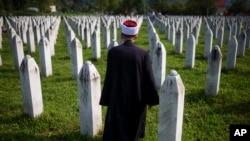During the Bosnian war, which lasted from 1992 to 1995, Bosnian Serbs, one of the large ethnic groups that made up the former country of Yugoslavia, was on a quest to establish an ethnically homogenous homeland, the Republika Srpska. Standing in the center of their chosen territory was Srebrenica, historically the home to a majority Bosnian Muslim population.
For three years, Bosnian Serb nationalists hounded and terrorized Srebrenica’s Muslim Bosniak population. Finally, toward the end of the war, units of the Bosnian Serb Army of Republika Srpska, under the command of General Ratko Mladić, forced their way into the besieged enclave of Srebrenica, a "safe area" under United Nations protection. The Serbian troops rounded up the population, including hundreds of refugees from surrounding villages. They separated the women and youngest children, and then systematically murdered all males over the age of fifteen. Between July 11 and 31, 1995, they massacred 7 to 8 thousand unarmed men and boys.
The 1948 United Nations Genocide Convention defines genocide as "acts committed with intent to destroy, in whole or in part, a national, ethnic, racial or religious group". And that is what happened in Srebrenica, according to a report issued in 2004 by the Commission for Investigation of the Events in and around Srebrenica. Back then, the government of Republika Srpska, now an autonomous region within Bosnia i Herzegovina, issued an official apology. But 14 years later, the National Assembly of Republika Srpska rejected the report, claiming that many of the victims are still alive. To this day, denial of the Srebrenica genocide and glorification of those who committed these acts are common within the region.
Speaking at the 28th observance of the Srebrenica Massacre, U.S. Ambassador to Bosnia i Herzegovina, Michael Murphy said that the American people stand in solidarity with the victims, the survivors, and families who grieve for their loved ones.
“The facts about the genocide in Srebrenica have been established beyond the shadow of a doubt,” said Ambassador Murphy.
“The United States calls on the political leaders of Bosnia i Herzegovina to demonstrate respect for the truth, for the memory of the victims of the genocide in Srebrenica, and for the future of Bosnia and Herzegovina, which depends on their ability to acknowledge that genocide occurred in Srebrenica and take the necessary steps to right this and many other wrongs of the 1992-1995 war.”






